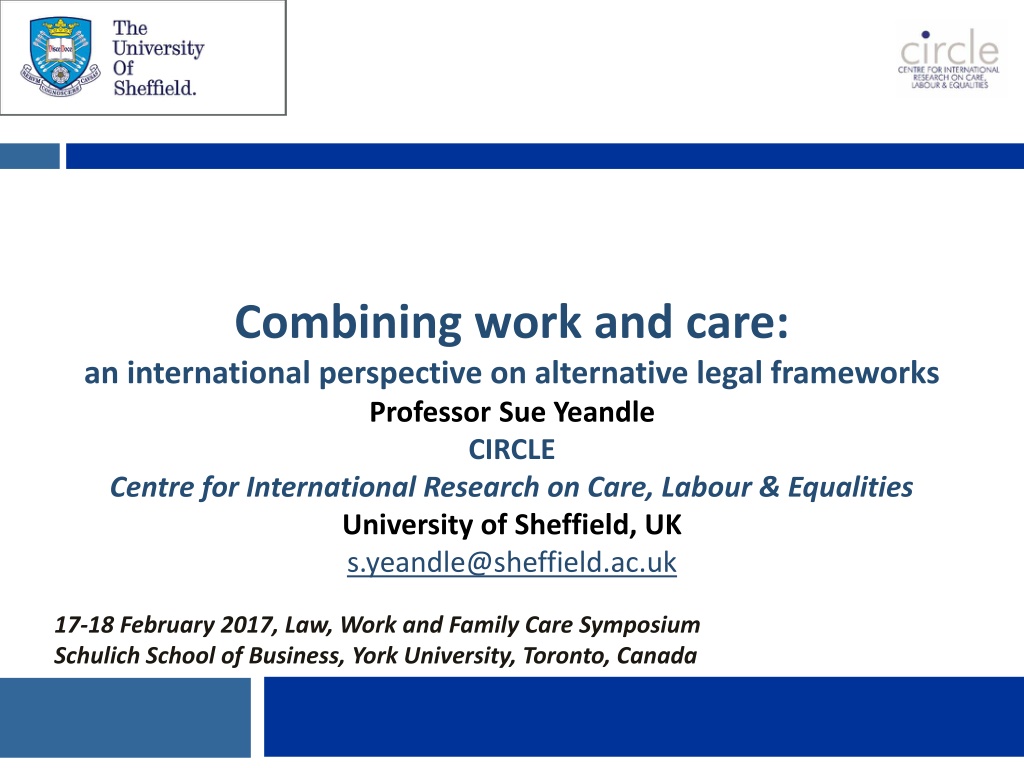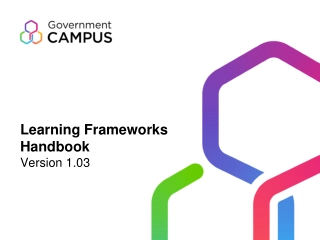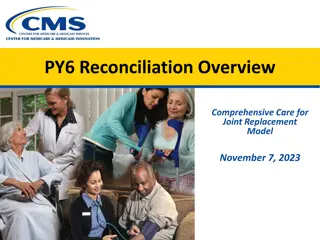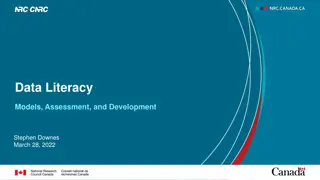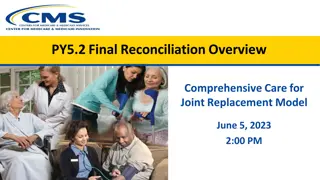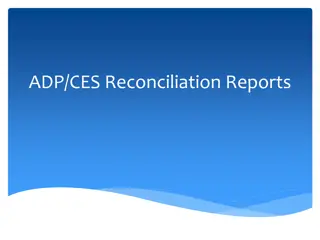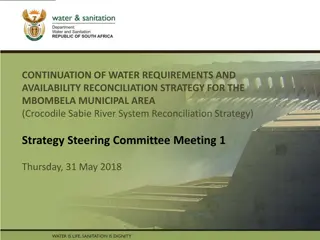International Perspectives on Work-Care Reconciliation Frameworks
This research discusses alternative legal frameworks for combining work and care responsibilities, focusing on policies supporting carers of disabled or elderly family members. It explores the challenges faced by working carers, such as balancing caregiving with employment and the need for supportive legislation. The concept of work-care reconciliation is examined in the context of population aging, changing family structures, and the desire for extended employment. Comparative analyses from international agencies like ILO and OECD inform the discussion.
- Legal frameworks
- Work-care reconciliation
- Family care policies
- Carer support
- International perspectives
Uploaded on Sep 17, 2024 | 0 Views
Download Presentation

Please find below an Image/Link to download the presentation.
The content on the website is provided AS IS for your information and personal use only. It may not be sold, licensed, or shared on other websites without obtaining consent from the author. Download presentation by click this link. If you encounter any issues during the download, it is possible that the publisher has removed the file from their server.
E N D
Presentation Transcript
Combining work and care: an international perspective on alternative legal frameworks Professor Sue Yeandle CIRCLE Centre for International Research on Care, Labour & Equalities University of Sheffield, UK s.yeandle@sheffield.ac.uk 17-18 February 2017, Law, Work and Family Care Symposium Schulich School of Business, York University, Toronto, Canada
Overview Concept, definitions and literature Framework, typology and methods Examples of legislative arrangements Employment protection Right to request flexible working Care(r s) leave Analysis / discussion Conclusions
Work-care reconciliation concept & definition WCR: policy measures to help parents (mothers) combine childcare/paid work extended to families managing care of adults and employment (Hein, 2005) EU, ILO, OECD*: influenced WCR concept which today claims attention of govts, policymakers, employers, TUs, NGOs re older/disabled adults & carers Focus /definition: WCR legislation to support carers supporting a close person with disability, chronic/terminal illness/ frail in old age Underpinning issues and predisposing factors: Population ageing Ageing in place Shift towards care outside hospital Desire for high employment and later retirement for women and men Family change Household composition
Care of an adult family member, for working age people: 4 Often a transient status Typically occurs in middle / later years of employment Most workers will experience this at least once Without support, pressure on them may become challenging (or impossible) to combine with paid work The speed and intensity of this is affected by: nature of the older person s needs availability of other, suitable, support its cost, accessibility and acceptability to the person needing care Pressures on working carers are affected by experience at work how demanding and time-consuming their job is if they can modify this to accommodate caring if they face financial difficulties in making these changes how their managers and co-workers respond
Literature recent comparative analyses Comparative analyses undertaken for international agencies* ILO 2005 OECD 2011 European Foundation for Improvement of Living & Working Conditions 2015 European Social Policy Network 2016 *Hein 2005; Colombo et al 2011; Jungblut 2015; Bouget et al 2016 Compendia of measures and policies (annual, main focus on childcare) International Review of Leave Policies and Related Research** ** Koslowski et al 2016 Systematic Review De Menezes & Kelleher 2011 (flexible working policies) Own academic work Kr ger & Yeandle [eds] 2013 Cass et al 2014 Yeandle 2016 UK government Task Force report Supporting Working Carers (2013) http://www.employersforcarers.org/resources/research/item/808-supporting-working-carers-the- benefits-to-families-business-and-the-economy
Framework for policy options Model for delivering sustainable and inclusive support for carers http://circle.leeds.ac.uk/files/2014/05/Challenge-of-Caring- Voice of older and disabled people and their rationale, scale, focus, targeting, efficacy carers, listening, envisioning, innovating Financial Support Measures to prevent financial hardship for carers *Figure developed by Yeandle & Fast: Evidence Work-Care Reconciliation Workplace and life course flexibility for employees, employers, labour force NGOs Services for Users and Carers Reliable, flexible, affordable, accessible and technology-enabled v6-low-res-WEB.pdf Carer Recognition and Rights The economic, social moral case value, respect, inclusion
Method and approach Focus on debates/evidence/campaigns for legislative and policy interventions to address WCR for carers Rationales for and orientations to a WCR policy agenda for carers Review of main features of national legislation on carers WCR Search for data on implementation strategies and processes Search for official, national impact indicators and measurement Focus on specific countries based on personal research/stakeholder contacts Declaration of personal interests / connections: Member, Employers for Carers Leadership Group (UK) Eurocarers Research Working Group (EU, Brussels) EU-funded work for Carers UK s project Action for Carers & Employment 2002-07; Commission, German Federal Ministry for Families, Senior Citizens, Women & Youth
Typology (original focus of review /data collection) Employment protection legislation Often focused on emergency , unpredictable, or crisis needs Legislation of the right to (request) flexible working First enacted in UK, later introduced in Australia and NZ Legislation on the right to (paid or unpaid care(r s) leave) Issues about eligibility, intended purpose, funding basis Measures based on equalities and human rights approaches, e.g. anti-discrimination measures; duty to accommodate , via rights to family life or to provide care Debated in Australia, Canada, UK, some other countries
Example 1 employment protection United Kingdom Employment Relations Act 1999 Job-protected, emergency, short-term, unpaid leave to care All employees are covered Finland Employment Contracts Act (2011 reform) Job protected care leave: absence for a temporary reason , including an unexpected, compelling family reason Unspecified period, often a few days Employers are not obliged to pay for the time off Australia Fair Work Act 2009(amended 2013 to give most carers of adults RTRFW) Included new National Employment Standards All employees, incl. casuals: 2 days unpaid carer s leave (UCL), each time a close family / household member needs care (illness, injury, emergency) FT/PT workers only get UCL if they have no paid sick / carer s leave left. All employees (not casuals) get paid sick & carer's leave (notice required), calculated using a formula, equivalent to approx. 10 days for a FT worker
Example 2 right to request flexible working - NZ 2007 Amendment to Employment Relations Act 2000 (Part 6AA Flexible Working Arrangements) (originally proposed for childcare only) Right to Request Flexible Working made available to employees with responsibility for care of any person one request per year, employees with 6thmonths service Employer must respond within 3 months, can refuse on business grounds* FW included work hours, work schedules, place of work 2014 Amendment to Employment Relations Act Extended RTRFW from caregivers to all employees Introduced the right to request from 1st day of employment Reduced employer response time from 3 months to 1 month * Business grounds include: inability to reorganise work among existing staff or to recruit additional staff; detrimental impact on quality or performance; insufficiency of work during the periods the employee proposes to work; planned structural changes; and burden of additional costs
Example 3 care(rs) leave - Japan 1991Childcare Leave, Caregiver Leave & other Measures for the Welfare of Workers Caring for Children or other Family Members Act 1995Childcare & Family Care Leave Act Workers in standard FTE right to 93 days unpaid care leave and/or to reduce working hours for childcare &/or care of other family members Rationale: help employees to make arrangements when care needs change 1999 amendment: 40% wage replacement payment during care leave added More amendments followed, amid concern about LF drop-out to care* 2010 amendment: FT employees (min. 1yr service) 93 days partially paid leave for constant nursing care @40% usual salary funded by employment insurance Employers must also offer 1 of: reduced working hrs; flexi-time; limit on overtime 2016 amendment: (implemented January 2017) 93 days leave, but may be taken more flexibly (in up to 3 tranches) 67% of usual salary funded by employment insurance Working carers can claim exemption from working overtime Employers to take management actions to prevent supervisors / co-workers engaging in acts that harass employment environments of workers * Ikeda, S 2017 (in press) International Journal of Care & Caring Vol1 (1).
Analysis / discussion 12 WCR measures can be put in place in three main ways: Employer initiatives and exemplary schemes ( standards , charter marks ) Bargaining: arrangements negotiated by workers, managers, unions Changes in employment law Crucial elements are: Flexibility in where, when and how often people work Options to take time off when care demands are time-sensitive or high Information, guidance, support Key considerations: Who pays? Who is eligible? Scope, limits, discretion Cultures of work, how/when to change them, at national /organisational level Role of government, civil society, and social partners
Revised typology Care leave options, paid and unpaid, with cost-sharing arrangements acceptable to all parties (employers, workers with and without care responsibilities, governments and families). Flexible working options, in which some arrangements offer salary stability (varying when and where, but not how much work is done), while others offer reduced hours/workload/pay while caring, but compensate for lost earnings through public- or insurance-funded payments (or private resources). Job protection and return to work guarantees, so that short or longer spells away from work to care do not jeopardise career trajectories, job security or promotion prospects. Pension and employment insurance protections, so that work-related benefits are not lost by carers who opt to reduce their employment, fully or partially, on a temporary or permanent basis.
Concluding points No country has introduced a full suite of available legislative options, though policy and legislative arrangements in different nations seem to be converging Many measures have been modified within a few years; policymakers seem to be experimenting with policies, seeking to find what is acceptable to employers or workers and responding ad hoc to opinion, campaigns or perceived problems WCR measures have not been systematically evaluated to identify the difference they may make, or assess how carers in different circumstances experience them Details of take-up, awareness, cost-benefits etc. are rarely available WCR measures should be seen in context of other policies to support caring, eg: Developing local care services Providing allowances to carers who quit work Invoking human rights and non-discrimination legislation Political complexion, employment law and social insurance traditions and the extent to which statutory, private & voluntary organisations work together also seems to be important
References international comparative analyses Bouget, D, Spasova, S & Vanhercke, B (2016) Work-life balance measures for persons of working age with dependent relatives in Europe: a study of national policies, Brussels: European Commission file:///U:/ManW7/Downloads/KE-01-16-434-EN-N%20(5).pdf Cass, B, Buckner, L ,Fast, J, Hill, P, Keating, N, Thomson, C, Wong, M & Yeandle, S (2014) The challenge of caring, now and in the future: learning from across the worldUniveresity of Leeds http://circle.leeds.ac.uk/files/2014/05/Challenge-of-Caring-v6-low-res-WEB.pdf Colombo, F, Llena-Nozal, A, Mercier, J & Tjadens, F (2011) Help Wanted? Providing and Paying for Long-Term Care, Paris: OECD de Menezes, LM & Kelliher, C (2011) Flexible Working and Performance: A Systematic Review of the Evidence for a Business Case, International Journal of Management Reviews, Vol. 13, 452 474 Heathrose Research Ltd (2011) Flexible Work Arrangements Literature Review, report to the National Advisory Council on the Employment of Women (NACEW) http://women.govt.nz/sites/public_files/flexible-working-literature-review%20(1).pdf Hein, C (2005) Reconciling Work and Family Responsibilities: practical ideas from global experience, Geneva: International Labour Office Jungblut, J-M (2015) Working and Caring: Reconciliation measures in times of demographic change, Eurofound, Publications Office of the European Union, Luxembourg https://www.eurofound.europa.eu/sites/default/files/ef_publication/field_ef_document/ef1534e n.pdf Koslowski, A, Blum, S & Moss, P (2016) 12th International Review of Leave Policies and Related Research 2016, International Network on Leave Policies and Research, http://www.leavenetwork.org/fileadmin/Leavenetwork/Annual_reviews/2016_Full_draft_20_July.pdf Kr ger, T & Yeandle, S (eds.) (2013) Combining Paid Work and Family Care: policies and experiences in international perspective, Bristol: The Policy Press Yeandle, S (2016) Caring for our carers: an international perspective on policy developments in the UK , Juncture, Vol 23, 1, 57-62 15
International Journal of Care and Caring New Journal Announcement from Policy Press Vol. 1 2017 3 issues Print ISSN 2397-8821 Online ISSN 2397-883X Editor in Chief: Sue Yeandle, University of Sheffield, UK Co-Editors: Yueh-Ching Chou, National Yang-Ming Univ. Taiwan Michael Fine, Macquarie University, Australia Joan Tronto, University of Minnesota, USA The International Journal of Care and Caring will: publish high quality contributions on care, caring and carers from all regions of the world cover care and caring for people of any age who have long- term conditions, disabilities or frailties, are seriously ill or near end of life explore the economic, organisational, political, social, legal, familial, transnational & ethical settings in which care occurs Free to access Debates & Issues section for international sharing of ideas and experience: a voice for policymakers, carers organisations, trade unions, employers and academics For more information, or to submit an article, please email: ijcc@sheffield.ac.uk Website: http://policypress.co.uk/journals/international- journal-of-care-and-caring
